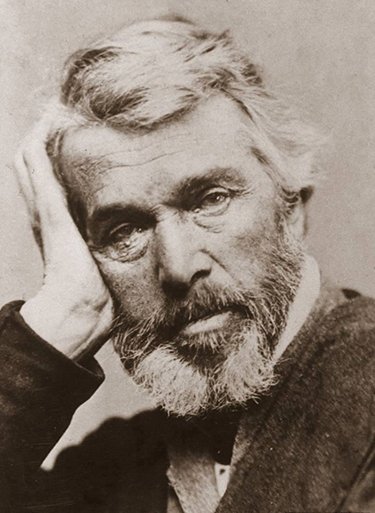Category Archive 'Thomas Carlyle'
19 Feb 2023


Counter Terrorism Policing \ What We Do \ Prevent
Be thankful every day that you don’t live in California or in Britain where the newest, craziest, and most extreme forms of contemporary insanity flourish, multiply, and metastasize in more outrageous and virulent forms every week.
Douglas Murray, in The Spectator, recently noted in an editorial that British Counter Terrorism’s Prevent’s “Research Information and Communications Unit” (RICU) identified some potential sources of indoctrination in right-wing extremism.
[A]ccording to RICU there were warning signs if people absorbed information or opinions from ‘pro-Brexit and centre-right commentators’. These included Jacob Rees-Mogg, Melanie Phillips, Rod Liddle and yours truly. So everybody reading this column is at as much risk of being ‘radicalised’ as some young Muslim settling down with a tape recording of Ayman al-Zawahiri or Osama bin Laden, and Rees-Mogg becomes the equivalent of a finger–waving imam sending the young off to become martyrs in the cause of Allah. Which is strange because he never came across that way to me when we crossed paths at Conservative Philosophy Group meetings.
I have since been able to look over some of this pathetic material provided at public expense and can confirm that it gets worse. In one RICU document a number of books are singled out, the possession or reading of which could point to severe wrongthink and therefore potential radicalisation. These include a book on the Rotherham rape gangs, books by Peter Hitchens, Melanie Phillips and – once again – me. Without wanting to beat my own drum, the book of mine that is singled out for this sinister treatment is my 2017 work The Strange Death of Europe. This book spent almost 20 weeks in the Sunday Times bestseller lists, has been translated into dozens of languages and was for some time the bestselling non-fiction book in the UK. So that is an awful lot of potential radicals just there. …
When I first saw these documents I felt a sort of white-hot anger. But then I read on and saw that these same taxpayer-funded fools provide lists of other books shared by people who have sympathies with the ‘far-right and Brexit’. Key signs that people have fallen into this abyss include watching the Kenneth Clark TV series Civilisation, The Thick of It and Great British Railway Journeys. I need to stress again that I am not making this up. This has all been done on your dime and mine in order to stop ‘extremism’ in these islands.
[Emphasis added.]
These include Leviathan by Thomas Hobbes, John Locke’s Two Treatises of Government and Edmund Burke’s Reflections on the Revolution in France, as well as works by Thomas Carlyle and Adam Smith. Elsewhere RICU warns that radicalisation could occur from books by authors including C.S. Lewis, J.R.R. Tolkien, Aldous Huxley and Joseph Conrad. I kid you not, though it seems that all satire is dead, but the list of suspect books also includes 1984 by George Orwell.
So in general, I begin to feel in good company. If government agencies are going to compile lists of suspect books, then I am very happy to stand condemned alongside these fine people, both living and dead.
RTWT
14 Apr 2020


Either Thomas Carlyle or Curtis Yarvon, hard to tell.
Jonathan Radclyffe discusses the latest instantiations of Moldbugism in the same delightfully learned, amusingly provocative, and ungodly prolix manner of the original, prose as dense and ultimately indigestible as a Christmas fruitcake.
Still, I do not believe that I have ever read a better précis of Moldbugian Neo-Reactionism.
Recently something rather unexpected happened. Curtis Yarvin began writing again. A decade ago, back in the spotty youth of the internet when blogs meant something, Yarvin, a Silicon Valley computer programmer, made a cult name for himself under the nom de plume of reactionary political philosopher Mencius Moldbug. Often memed, frequently cited as an important ancestor of the “alt-right†(but largely left unread) and father of the online political movement known as NRx/neo-reaction (which has been declared dead endlessly since at least 2013), Moldbug may well be the only notable political philosopher wholly created by and disseminated through the internet.
In his journey from Austrian Economics to attempting to update early modern absolute monarchy for the information age, Yarvin regularly churned out tens of thousands of word screeds on his blog Unqualified Reservations (UR) about the need to privatise the state and hand it over to an efficient CEO monarch to keep progressives out, the Christian roots of progressivism, and encomia to nineteenth century Romantic Thomas Carlyle. All of this was so liberally coated in rhetorical irony and Carlylean bombast that it was often difficult to tell what was supposed to be serious and what was not. Moldbug was among the first to discover the power of reactionary post-irony, though these days of course, playing long-read rhetorical games to affect ideological change seems a rather primitive affair. The work of post-irony can now be compressed into a couple of memes very easily.
Between 2007 and 2010 Moldbug was immensely prolific. Thereafter UR petered off as Yarvin turned his efforts increasingly towards developing a blockchain-based data-storage scheme called Urbit.[1] By 2014, when Moldbug began to become a household name across the internet as the social media platforms were increasingly politicised, Moldbug was pretty much finished writing. In April 2016 UR was wrapped up with a “Coda†declaring that it had “fulfilled its purpose.†The same month attendees threatened to withdraw from the LambdaConf computing conference because the “proslavery†Yarvin would be speaking at it (Towsend 2016).[2] To this Yarvin (2016a) wrote a reply insisting on the innocence of his Moldbuggian stage as simply a matter of curiosity about ideology. The same year in an open Q&A session about Urbit on Reddit, Yarvin (2016b) was more than happy to answer some questions about Moldbug and defend both projects as parts of a dual mission to democratise the current monopolies controlling the internet and to dedemocratise politics for the sake of enlightened monopoly.
In early 2017, following Trump’s election, rumours began to circulate that Yarvin was in communication with Steve Bannon, though nothing came of this (Matthews 2017b). Around the same time Yarvin was quoted as supporting single-payer healthcare (Matthews 2017a). News also surfaced that Yarvin was on a list of people to be thrown off Google’s premises, should he ever make a visit (Atavisionary 2018). Then, early in 2019, Yarvin (2019a) quit Urbit after seventeen years on the project, causing some to wonder whether Moldbug might now make a return. Old rumours also began to get about the place that Yarvin was behind Nietzschean Twitter reactionary Bronze Age Pervert (BAP), especially after Yarvin passed a copy of BAP’s book Bronze Age Mindset to Trumpist intellectual Michael Anton (2019) with the insistence that this was what “the kids†are into these days. And now Yarvin has started publishing again, under his own name, a decade on from the salad days of UR. On the 27th of September 2019 the first of a five-part essay for the conservative Claremont Institute’s The American Mind landed, titled “The Clear Pill.â€
If Moldbug/Yarvin is famous for one thing, it is that he’s the fellow who put the symbol of the “red pill†into reactionary discourse. The “Clear Pill†promises to be a reset of ideology in which progressivism, constitutionalism and fascism will each receive an “intervention†through their own language and values to show up how “ineffectual†each is (Yarvin 2019b). Thus far this “clear pill†sounds all rather typically Moldbuggian–for Yarvin it has always been about resetting the state and the rhetoric of undoing brainwashing. Anyone passingly familiar with the oeuvre of Moldbug knows that Yarvin is more than capable of speaking all three of these political dialects reasonably well, even if, as Elizabeth Sandifer (2017) astutely notes, Moldbug is so deep in neoliberal TINA [DZ: “TINA” is slang for crystal meth.] he is unable to take Marxism seriously as a contemporary opponent at all. For Moldbug the American liberal pursuit of equality was always more “communist†than the USSR, which is to say, paranoid reactionary hyperbole aside, that he only ever regarded Marxism as an early phase of progressivism.
And yet, six months on from the first part of the “Clear Pillâ€, only a second of the promised five parts has thus far been published. Part two (Yarvin 2019c), or “A Theory of Pervasive Error†appeared on the 25th of November, and, so one might surmise, even the most die-hard Moldbug-fans must have found it somewhat lacking. The initial purpose of the piece seems to be to outline a theory of human desire that utilises the Platonic language of thymos (courageous spirit), but ends up sounding far closer to a Neo-Darwinian Hobbes than anything else. Human beings are petty and selfish beasts, we are encouraged to believe. The essay meanders on until it finally arrives at the simple old Moldbuggian point that because liberal “experts†in governance and science have a touted monopoly on truth, they should not automatically be trusted. That’s it. By taking such the long way around to say something so simple and banal, the result is more than a little anticlimactic. Perhaps after all these years the bounce has gone out of Yarvin’s bungy; his lemonade has gone flat.
The only other piece to appear on The American Mind from Yarvin since “A Theory of Pervasive Error†has not been part of this “Clear Pill†series, but a stand-alone essay published on the 1st of February 2020 titled “The Missionary Virusâ€. In this Yarvin argues that the recent coronavirus pandemic offers an unparallel opportunity to dismantle American “internationalism†and reboot a politically and culturally multi-polar world while economic globalisation continues. Imagine, Yarvin asks the reader, what it would be like if the virus did not go away and the travel bans lasted not a month, but a decade, or centuries. One thing can be said about this essay that cannot be said of the “Clear Pill†so far – at very least it is entertaining. Perhaps parts three to five of the “Clear Pill†will actually say something interesting after all.
Indeed there are all sorts of questions that are still left unanswered. Will the crescendo of part five simply restate the need to privatise governance and let the market system work? Will Yarvin take some drastic new turn or even disown Moldbug? Will he finally acknowledge eccentric death-cultist Nick Land, who, for the best part of this decade has largely been the “king†of NRx as a political ideology? We must wait and see.
It goes on… and on… and on.
TWT
03 Dec 2017


Thomas Carlyle 1795-1881
LATTER-DAY PAMPHLETS.by Thomas Carlyle NO. I. THE PRESENT TIME. [February 1, 1850.]:
I say, it is the everlasting privilege of the foolish to be governed by the wise; to be guided in the right path by those who know it better than they. This is the first “right of man;†compared with which all other rights are as nothing,—mere superfluities, corollaries which will follow of their own accord out of this; if they be not contradictions to this, and less than nothing! To the wise it is not a privilege; far other indeed. Doubtless, as bringing preservation to their country, it implies preservation of themselves withal; but intrinsically it is the harshest duty a wise man, if he be indeed wise, has laid to his hand. A duty which he would fain enough shirk; which accordingly, in these sad times of doubt and cowardly sloth, he has long everywhere been endeavoring to reduce to its minimum, and has in fact in most cases nearly escaped altogether. It is an ungoverned world; a world which we flatter ourselves will henceforth need no governing. On the dust of our heroic ancestors we too sit ballot-boxing, saying to one another, It is well, it is well! By inheritance of their noble struggles, we have been permitted to sit slothful so long. By noble toil, not by shallow laughter and vain talk, they made this English Existence from a savage forest into an arable inhabitable field for us; and we, idly dreaming it would grow spontaneous crops forever,—find it now in a too questionable state; peremptorily requiring real labor and agriculture again. Real “agriculture†is not pleasant; much pleasanter to reap and winnow (with ballot-box or otherwise) than to plough!
Who would govern that can get along without governing? He that is fittest for it, is of all men the unwillingest unless constrained. By multifarious devices we have been endeavoring to dispense with governing; and by very superficial speculations, of laissez-faire, supply-and-demand, &c. &c. to persuade ourselves that it is best so. The Real Captain, unless it be some Captain of mechanical Industry hired by Mammon, where is he in these days? Most likely, in silence, in sad isolation somewhere, in remote obscurity; trying if, in an evil ungoverned time, he cannot at least govern himself. The Real Captain undiscoverable; the Phantasm Captain everywhere very conspicuous:—it is thought Phantasm Captains, aided by ballot-boxes, are the true method, after all. They are much the pleasantest for the time being! And so no Dux or Duke of any sort, in any province of our affairs, now leads: the Duke’s Bailiff leads, what little leading is required for getting in the rents; and the Duke merely rides in the state-coach. It is everywhere so: and now at last we see a world all rushing towards strange consummations, because it is and has long been so!
 
I do not suppose any reader of mine, or many persons in England at all, have much faith in Fraternity, Equality and the Revolutionary Millenniums preached by the French Prophets in this age: but there are many movements here too which tend inevitably in the like direction; and good men, who would stand aghast at Red Republic and its adjuncts, seem to me travelling at full speed towards that or a similar goal! Certainly the notion everywhere prevails among us too, and preaches itself abroad in every dialect, uncontradicted anywhere so far as I can hear, That the grand panacea for social woes is what we call “enfranchisement,†“emancipation;†or, translated into practical language, the cutting asunder of human relations, wherever they are found grievous, as is like to be pretty universally the case at the rate we have been going for some generations past. Let us all be “free†of one another; we shall then be happy. Free, without bond or connection except that of cash-payment; fair day’s wages for the fair day’s work; bargained for by voluntary contract, and law of supply-and-demand: this is thought to be the true solution of all difficulties and injustices that have occurred between man and man.
 
To rectify the relation that exists between two men, is there no method, then, but that of ending it? The old relation has become unsuitable, obsolete, perhaps unjust; it imperatively requires to be amended; and the remedy is, Abolish it, let there henceforth be no relation at all. From the “Sacrament of Marriage†downwards, human beings used to be manifoldly related, one to another, and each to all; and there was no relation among human beings, just or unjust, that had not its grievances and difficulties, its necessities on both sides to bear and forbear. But henceforth, be it known, we have changed all that, by favor of Heaven: “the voluntary principle†has come up, which will itself do the business for us; and now let a new Sacrament, that of Divorce, which we call emancipation, and spout of on our platforms, be universally the order of the day!—Have men considered whither all this is tending, and what it certainly enough betokens? Cut every human relation which has anywhere grown uneasy sheer asunder; reduce whatsoever was compulsory to voluntary, whatsoever was permanent among us to the condition of nomadic:—in other words, loosen by assiduous wedges in every joint, the whole fabric of social existence, stone from stone: till at last, all now being loose enough, it can, as we already see in most countries, be overset by sudden outburst of revolutionary rage; and, lying as mere mountains of anarchic rubbish, solicit you to sing Fraternity, &c., over it, and to rejoice in the new remarkable era of human progress we have arrived at.
via The Framed Maelstrom.
Your are browsing
the Archives of Never Yet Melted in the 'Thomas Carlyle' Category.
/div>

Feeds
|






